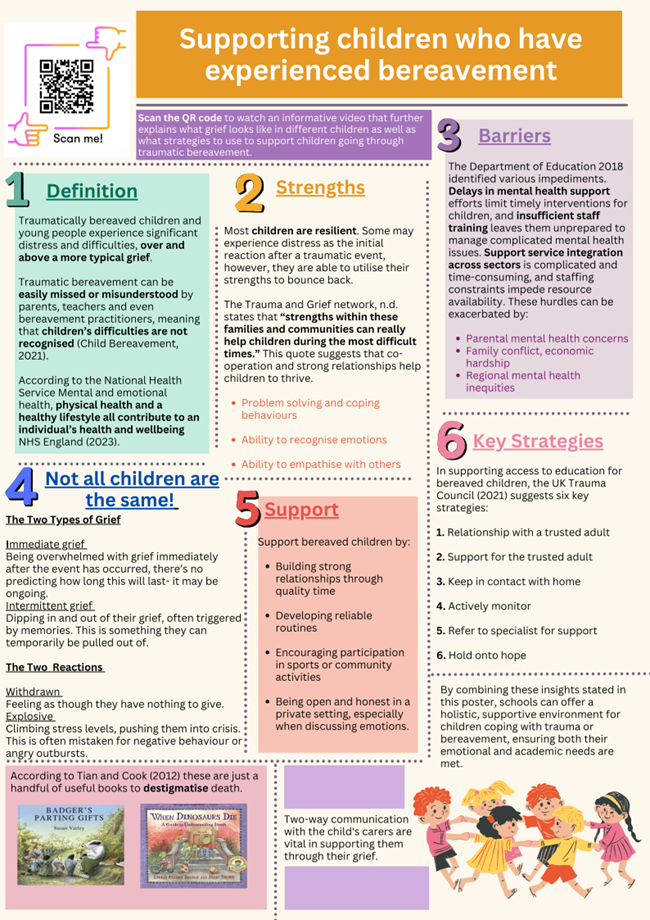Supporting children who have experienced bereavement
- Primary
- Education and Language
- Inclusion
- Bereavement
"Bereavement in primary schools is a crucial aspect of inclusion, as it directly impacts a child’s emotional and social well-being. Inclusive education aims to provide all children with equal opportunities to succeed, recognising that bereavement can present significant challenges that require tailored support. According to Child Bereavement UK (2021), traumatically bereaved children experience distress beyond typical grief, which can often go unrecognised by educators and caregivers. As a result, schools play a pivotal role in ensuring that these children feel understood, supported, and included in the learning environment. A key component of inclusive practice is acknowledging that children respond to grief in different ways. Some may withdraw, struggling with concentration and engagement, while others might exhibit behavioural challenges that stem from heightened stress levels (Anna Freud NCCF, 2022). In my placement, I observed a pupil who had recently lost a close family member. Initially, they displayed withdrawal behaviours, often disengaging from class discussions and group tasks. Recognising this, the class teacher implemented strategies that promoted emotional expression, such as guided journaling and participation in structured group activities. These small adjustments allowed the pupil to gradually re-engage with learning, demonstrating how inclusive practices can create a sense of belonging.
Literature highlights key strategies to support bereaved children in mainstream classrooms. The Trauma and Grief Network (n.d.) emphasises the importance of communication, trust, and care, which can be fostered through consistent routines, honest discussions, and opportunities for participation in extracurricular activities. In my experience, I have seen how reliable routines and designated safe spaces help grieving children manage overwhelming emotions. For example, a ‘calm room’ in the school provided all children with a quiet retreat when needed, enabling them to self-regulate and return to learning when ready, this space was monitored at all times by a member of staff.
A whole-school approach is essential to addressing bereavement inclusively. The Department for Education (2016) underscores the importance of fostering emotional resilience through activities like music, art, and cultural events. During my placement, I noticed how creative expression helped bereaved pupils process their emotions. In one instance, a class project involving poetry and storytelling encouraged a child to articulate feelings of loss in a safe and supported environment. This approach aligns with the UK Trauma Council’s (2021) recommendations, which advocate for trusted relationships, home-school collaboration, and continuous monitoring of children’s well-being.
However, there are barriers to ensuring effective support for bereaved children. The Department of Education (2018) highlights challenges such as limited staff training and delayed mental health support, which can hinder timely interventions. During my placement, I observed how time constraints and curriculum pressures made it difficult for teachers to provide consistent emotional support. This reinforces the need for structured professional development, equipping educators with the skills to identify and respond to grief-related needs effectively.
Adapting lessons to support bereaved children requires sensitivity and flexibility. Tian and Cook (2012) suggest creating opportunities for emotional expression and integrating discussions about bereavement into class reading. In practice, I have seen how literature can help normalise grief and reduce stigma. For instance, reading a book that subtly addresses loss provided a bereaved pupil with an entry point for discussing their feelings, reinforcing the importance of embedding inclusive narratives within the curriculum.
Ultimately, inclusive education for bereaved children involves a multi-faceted approach, combining emotional support, structured interventions, and strong relationships. By embedding these practices into daily school life, educators can help grieving pupils navigate their emotions while continuing to access meaningful learning experiences."
"This poster discussion and my reflection on inclusive practices in general have significantly deepened my understanding of effective teaching, particularly in addressing misconceptions, managing cognitive load, and fostering psychological safety. Vygotsky’s theory of assisted problem-solving has reinforced the importance of providing structured support, ensuring that learning remains within students’ zones of proximal development (Gredler, 2012). This highlights the role of scaffolding in enabling students to engage with challenging tasks while developing independent problem-solving skills. Cognitive load theory has emphasised the need to carefully sequence lesson content, breaking down complex concepts into manageable steps to prevent cognitive overload (Shibli & West, 2018). By structuring lessons effectively, I can help students retain and apply knowledge more successfully.Additionally, the importance of psychological safety in the classroom has become increasingly clear. A secure learning environment fosters engagement, encourages risk-taking, and supports both academic and personal growth (Hardie et al., 2022). When students feel safe to express their ideas without fear of judgment, they are more likely to participate actively and develop confidence in their learning. Recognising this, I will continue to prioritise creating an inclusive and supportive classroom culture.
These insights will directly shape my future teaching practice. I will strive to implement strategies that balance challenge with support, ensuring students have the guidance needed to develop their understanding. Furthermore, I will be mindful of lesson design, aiming to reduce unnecessary cognitive demands while maintaining high expectations. Ultimately, this reflection has reinforced the importance of being intentional in both instructional methods and classroom management, ensuring that all students are given the best opportunities to succeed."

